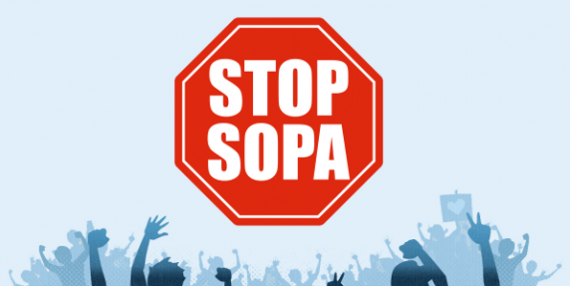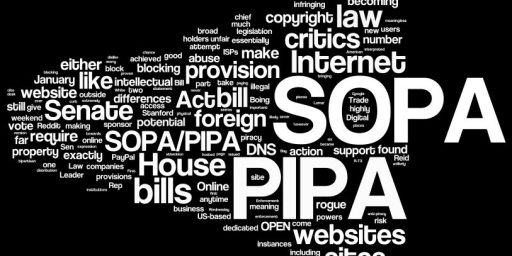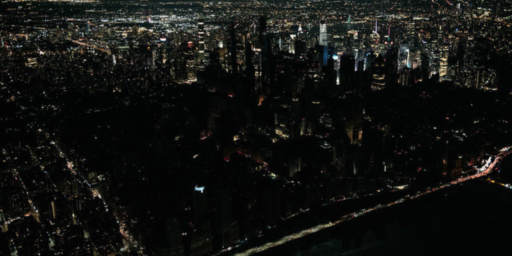SOPA/PIPA Blackout Protests Lead Co-Sponsors To Jump Ship
Members of Congress are responding to the protests against SOPA and PIPA by withdrawing their support for the bills.
Today’s decision by Wikipedia and other websites to go dark or take other action in protest of two controversial anti-piracy bills now pending in Congress has led some Members of Congress who were supporting the measures to change their mind:
An Internet blackout Wednesday by Wikipedia, Reddit, Mozilla and thousands of other sites against two anti-piracy bills in Congress has started to have its desired effect: Co-sponsors of the legislation have changed sides and other lawmakers have called for more debate before any vote.
Sen. Marco Rubio (R-Fla.) — who was a co-sponsor of the PROTECT IP Act — became the latest lawmaker Wednesday to pull his support. In the House, Rep. Ben Quayle (R-Ariz.), originally a co-sponsor of the Stop Online Piracy Act, pulled his name from the list of sponsors on Tuesday. A spokesman for Rep. Lee Terry (R-Neb.), meanwhile, told the Omaha World-Herald on Wednesday that the congressman is also unable to support SOPA as written.
The widespread Internet protest is even bringing new Washington voices into the fray. Mostly silent in the debate, Sen. Jim DeMint (R-S.C.) tweeted Wednesday he doesn’t back the bills.
“I support intellectual property rights, but I oppose SOPA & PIPA,” DeMint tweeted. “They’re misguided bills that will cause more harm than good.”
At least one member of Congress will also join the blackout protest unfolding across the Web. Freshman Rep. Justin Amash (R-Mich.), who represents the libertarian wing of the GOP, changed his Facebook profile photo to a logo of the words SOPA and PIPA crossed out and he also disabled his Facebook wall so people cannot post content to it.
“These bills give the federal government unprecedented power to censor Internet content and will stifle the free flow of information and ideas,” Amash wrote in a post on his profile. “Demand that Congress and the president keep the Internet open and free.”
So it would appear that the protests, and the awareness that they are bringing to an issue that Americans who don’t follow these issues regularly, are causing some on Capitol Hill to back away from the bills, at least in their present form. There is already talk this afternoon that the Senate will follow the House and put off consideration of the bill until the defects that the technology community and others have pointed to can be addressed. In either case, it is quite obvious that the smooth sailing that many SOPA/PIPA supporters foresaw for the bills only months ago is not going to happen and that they are going to have to give up on some of their more controversial demands if the bill is going to pass.
Perhaps that’s why Chris Dodd, former Senator and current head of the Motion Picture Association of America, is so upset about today’s protests:
Hollywood’s chief lobbyist lashed out at tech companies for mounting Tuesday night’s planned online blackout to protest proposed anti-piracy legislation that has pitted Southern California movie and music distributors against Silicon Valley Internet corporations.
Motion Picture Assn. of America Chief Executive Chris Dodd, the former Senator from Connecticut, accused technology companies such as Google, Mozilla and Wikipedia of resorting to stunts.
As part of the largest online strike in history, thousands of websites planned to black out their pages or shut down completely starting Tuesday night to protest anti-piracy bills they feel would limit freedom of speech and saddle legitimate websites with onerous legal costs.
But Dodd called the blackout a “dangerous gimmick.”
“It is an irresponsible response and a disservice to people who rely on them for information and who use their services,” Dodd said in a statement. “It is also an abuse of power given the freedoms these companies enjoy in the marketplace today.”
The only thing I can conclude from this is that the people who pay Dodd’s salary — the big Hollywood studios principally — are upset by the fact that their effort to ram this flawed bill through Congress has apparently been thwarted by the fact that people are learning about what’s in it thanks to the very Internet they seem to view as an enemy rather than a potential marketplace. Well guys, that’s how the democratic process works.
As I said yesterday, there is a legitimate purpose behind these bills but the form that they are presently in is simply unacceptable. Now that the light of day has been shed upon what Congress was trying to do here perhaps we can all have a real discussion about the importance of protecting both intellectual property rights and the freedom of communication on the Internat and protection of fair use rights.







So…the MPAA’s master plan is to attack nonprofits like the Mozilla Foundation and Wikipedia?
Yay!
Want a fun read?
https://twitter.com/#!/herpderpedia
I honestly didn’t think my opinion of Chris Dodd could be lower, until I read this post.
He was all over the cable networks today apparently repeating this line. The MPAA is obviously concerned about these protests.
Wait a minute — protests worked? I thought anyone who protested was a dirty hippy in a drum circle, and the only way to achieve political change was to donate money to candidates who would then win elections.
Is everything I learned from Doug wrong?
@WR
You reek of bongo drums…
I generally don’t have enough interest in intellectual property rules to have an opinion on these kinds of matters. But that Chris Dodd motivated me to form an opinion on this one.
Reading the MPAA blog and Twitter account makes me nauseous. I know that everyone spins, but the blatant lying from them is absolutely astounding. “SOPA and PIPA would not remotely target Facebook, Google, YouTube, or Wikipedia…” Clearly, someone is smoking crack or hasn’t read their own bill or both.
@Doug Mataconis: Now we know why they really hate the intertubes.
Well, if there’s anyone who knows about abuse of power, Chris Dodd is one of them.
The problem is that he can’t recognize it when he’s in the middle of it. He couldn’t in the Senate and he can’t here.
So much for future Republican “Superstar” Rubio…he’s just another flip floppin’ Romneyite.
@Doug Mataconis: 30 years ago the MPAA was concerned about VCRs destroying the movie industry. So much so that their President when speaking before Congress said “I say to you that the VCR is to the American film producer and the American public as the Boston strangler is to the woman home alone.” Chicken little like rants are the norm.
An amazing and constructive response here:
In response to SOPA/PIPA, I am releasing some of my photographs to the public domain.
Great nature (insect) photos.
While I’m against SOPA and PIPA and any other attempt to police internet content, I’m soooooo tired of protests…..
Something about not picking a fight with some one who can deliver pixels by the barrel load comes to mind, but the MPAA etc didn’t think their cunning plan all the way through.
I’m sure it was my strongly worded letters to my Rep., Buchannan and the only sentient one of my Senators, Rubio, that made the difference.
@John Burgess: The problem is that
heyou can’t recognizeitit’s not abuse of power when he’s in the middle of it.HeYou couldn’t in the Senate andheyou can’t here.FIFY
@Ben Wolf:
Seriously! Eff Dodd.
Almost as “good” as Dodd were Murdoch’s tweets on the subject:
“”Nonsense argument about danger to internet. How about Google, others blocking porn, hate speech, etc? Internet hurt?”
I think he seems to think that Google blocks porn and hate speech…
Well, well, Congress can be moved by the People after all. I suggest we darken the Internet until the Patriot Act is repealed, and Citizen’s United is overturned. The ship may just right itself thereafter.
A pity.
Due to its unconditional free speech rules, the US has long played safe haven to German Nazi pages fleeing the penal laws in place in Germany.
Since the federal government holds all rights to “Mein Kampf” this would have been a rather elegant way of taking those suckers offline for good :D.